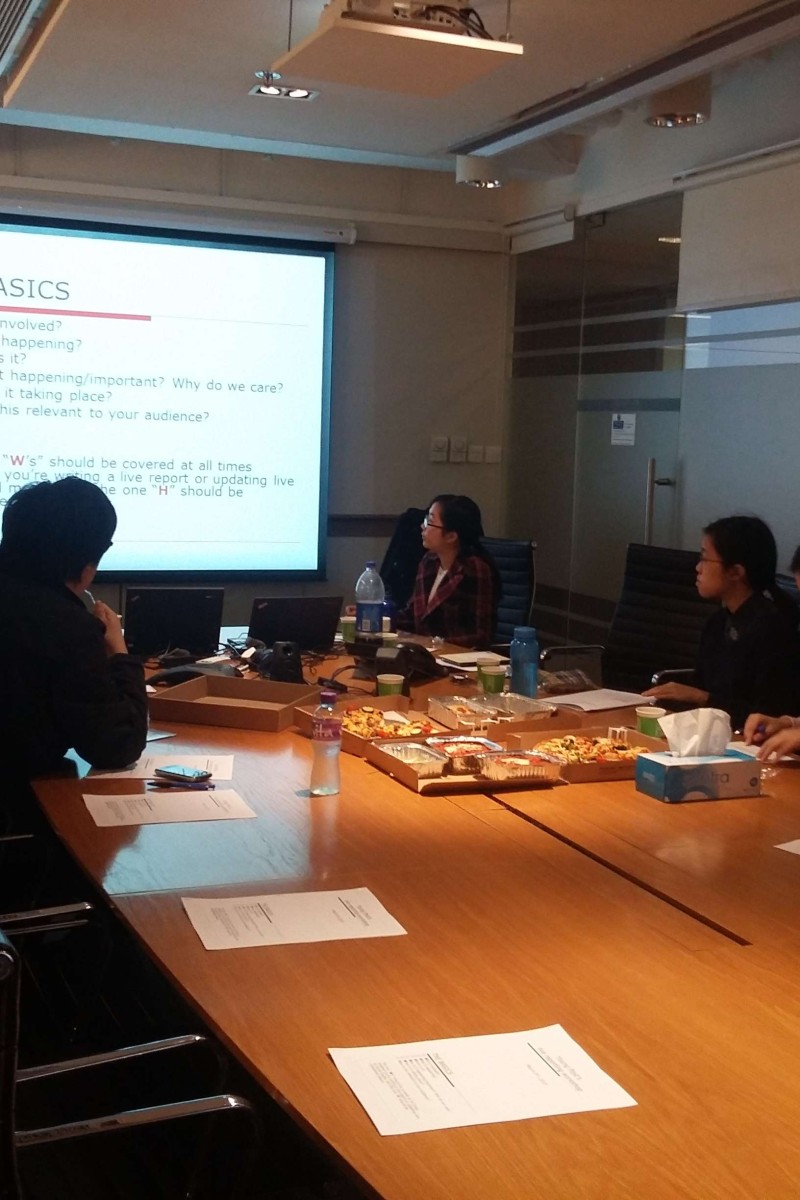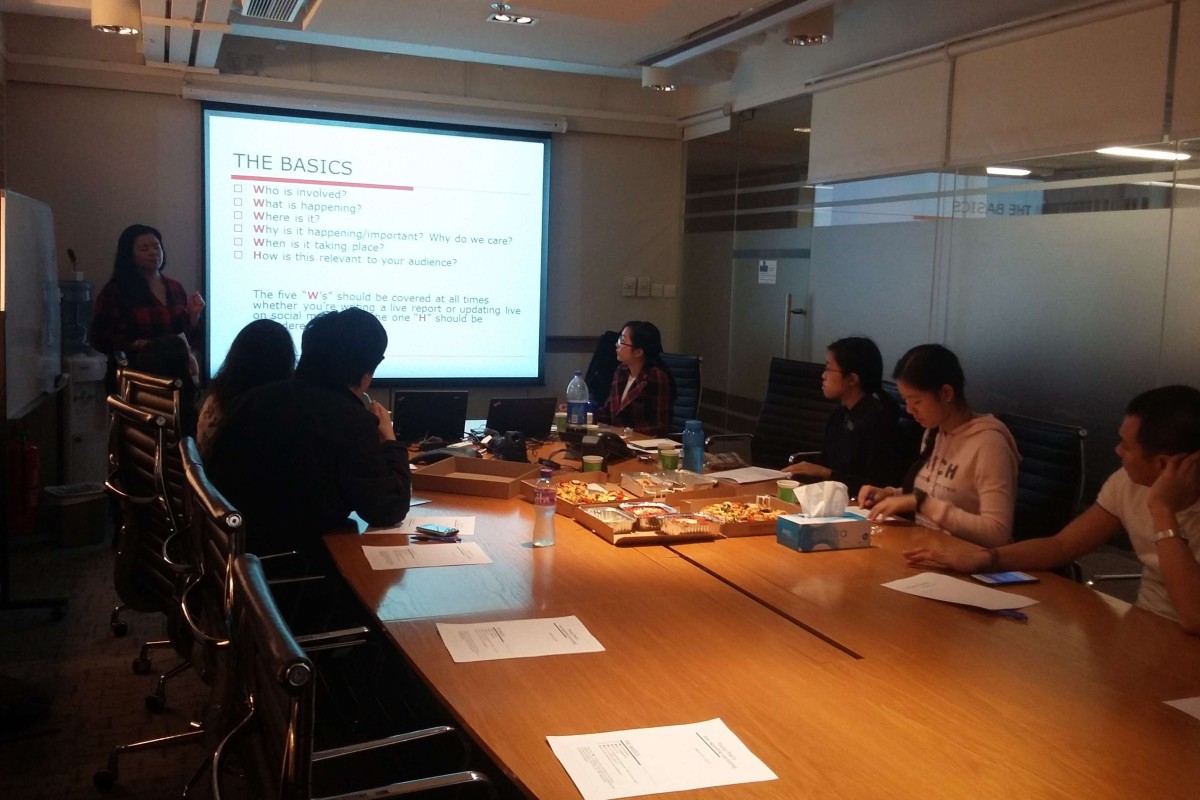
Junior reporters find out that live reporting is stressful and exhilarating
 Junior reporters learned that live reporting isn't just about turning up and throwing out information.
Junior reporters learned that live reporting isn't just about turning up and throwing out information.Mastering the skills for live reporting has always been a myth to me. Before attending Young Post’s live reporting workshop, I thought of live reporting as the “mission impossible” in the world of journalism, given how demanding and complex a task it is.
I’ve always wondered: how is it possible to meet the basic standards of traditional reporting, such as making sure the facts are accurate, while posting new information on various social media platforms simultaneously? How do I select and summarise the most important information while keeping it within the given word limit? Last but not least, is it actually possible to plan ahead for an event that hasn’t even happened yet? While questions like these always left me doubting my own abilities of ever doing a live report successfully, they also made me extremely eager to learn as many things as I could during the workshop.
The major takeaways from the workshop were: learning about the importance of cooperation, planning ahead, as well as paying attention to trivial details.
Back in 2014, I had my first taste of live reporting when I was chosen to report on an award ceremony called Student of the Year for Young Post’s Instagram page. I didn’t communicating with my partner, fellow junior reporter Renee, in advance, and we found ourselves overwhelmed by the never-ending flow of incoming information as we frantically searched around for someone to help us confirm the names of each of the recipients. Unfortunately our efforts were futile, as the event kept on rolling as we struggled with the most basic facts. Thus, the root of the problem, which was a lack of preparation, really effected our performance to say the least.
The good news is that this problem can be easily solved by “doing your homework”. That means gathering all the existing information about the event to ensure that at least you have the basic facts right. By doing so, live reporting instantly becomes similar to a fill-in-the-blank kind of game. By being prepared, you have the time and ability to react to any unexpected situations. For instance, for an event like Student of the Year, it’s impossible for us to know who’s going to win beforehand. However, we do know the names of the nominees. So instead of trying to jot the winners’ names down on the day of the event, while worrying if they are spelled correctly, why not try putting all the nominees in a list on your phone so that at the time of the announcement, all you need to do is to copy and paste?
Young Post’s web sub-editor Heidi Yeung had another helpful tip when working as a team. “Decide in advance who will cover what and who is responsible for which role,” she said. This is crucial for live reporting as it helps to prevent any repetitions or a lack of posts on certain subjects, etc.
Since live reporting is so heavily reliant upon electronics, you should make sure your devices are fully charged at all times to keep the communication channel open between your teammates. This might sound like a no-brainier, but it is the small details like these that determines whether live reporting is a success or a failure.
To say the workshop met all of my expectations would be an understatement. It was a thorough, well-organised event with plenty of hands-on experience. Not only did it teach me the basic theories, it also taught me how to apply them in the real world as a professional reporter.
For this reason, the simulation in which we reported on different scenes from The Hunger Games was definitely the highlight of my experience.
After being split into two teams, each of us took turns working at the “live event” to record all the important details and update our teammates back at the office, who were entirely dependent on us to provide a story. I really enjoyed the adrenaline rush of working under pressure while trying to maintain a high level of accuracy and precision.
Put simply, this workshop has absolutely helped me to overcome my fear of live reporting. With a lot more practice and actual experience, I’m confident that I’ll be able to handle any future live reporting opportunities with ease.
Veronica Lin, 16, HKIS
A pressure cooker of adrenaline
Harder than it looks
The live reporting workshop was so much harder than expected. In theory, the work sounded easy. Just take a couple of pictures and post them with nice captions and hashtags. That was until we put it into practice. The words just kept coming and everything was either too fast or too slow. Everyone was on edge and glad when the task was over.
This was not what I had expected. The reality is that it’s so much more complex than regular reporting. What surprised me most was that even though it was stressful and intense, I got a real buzz from being the one to share the information, and know what was going to be displayed on the page.
Irisa Kwok, 12, King George V School
The changing world of news
In the age of technology and rapid communication, journalism is not only about writing and publishing newspapers, it also involves instant live reporting on social media. As an aspiring journalist, I have participated in several news-writing courses, but I have never experienced anything quite as tense and high-pressured as the live-reporting workshop. During the stimulation, it was challenging to update the news and photos on social media, while simultaneously sending the information back to the rest of the group, as other members of the team rushed to complete the standing story. The atmosphere was so tense, as we worked against the clock to complete the tasks in such a short period of time. It made me realise how reporting has had to adapt to our modern way of living, while still uploading the accuracy of journalism.
Yam Wai-shan, 17, St Paul’s Co-educational College